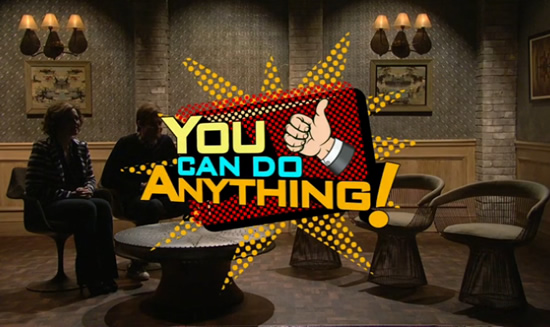If there’s one thing Saturday Night Live is good at in an election year, it’s lampooning politicians—whether it’s been Chevy Chase as Gerald Ford, Darrell Hammond as Bill Clinton, or Dan Akroyd as Bob Dole. But last weekend, SNL offered up an unusually insightful bit of non-presidential social commentary—this time taking a swipe at America’s coddled, self-esteem-driven, success-less culture.
You’d be better off watching the clip from the show (it’s much funnier than this summary), but in the interest of keeping it simple, a skit last week featured two talk show hosts interviewing 20-somethings about their special talents—a juggler who couldn’t juggle (but was “full of unearned confidence”), a “Twitter-famous” non-celebrity singer-songwriter whose confidence is through the roof because no one ever told him “how mediocre” he is, and a college grad with a passion for Chinese calligraphy and Irish dancing, played by “Harry Potter’s” Daniel Radcliffe. (“The world needs more singer-songwriters and fewer doctors and engineers!”) In the hosts’ words, “You can do anything!”
In the midst of humor, SNL struck on a sad reality for much of American culture. Faux-celebrities are placed on pedestals, while real success is shot down. As we’re seeing in politics today, true measures of economic success—such as opening a business and making a profit—have become something of a scarlet letter rather than a badge of honor. Capitalism and the free market are under assault, politicians are fomenting class warfare, and a target has been drawn squarely on our country’s job creators. Last year, for example, President Obama made a call for “fairness” and higher taxes on the wealthy—implying that making “too much” money is patently unfair. And that’s despite the fact that the top 10 percent of income earners pay 70 percent of income taxes and the bottom 50 percent of income earners paying only 3 percent of income taxes.
While the left tears down the haves, the have-nots are subsisting on government assistance, continuing on in a state of dependence yet not being encouraged to improve their lot in life. Take a look at the facts:
Welfare spending is projected to cost taxpayers $10.3 trillion over the next 10 years, more than 40 million people are on food stamps, and 70 different means-tested anti-poverty programs provide cash, food, housing, medical care, and social services to poor and low-income persons. But as The Heritage Foundation’s Katherine Bradley and Robert Rector explain, while those programs provide much-needed aid to America’s poor, they don’t do anything to help the recipients get back on their feet and move off of government assistance. Though it’s not exactly a celebration of mediocrity, it’s an acceptance of how things are rather than an effort to help make people’s lives better in the long run. In other words, it’s a handout, not a hand up.
Want another example of tacitly accepting failure as the norm? Take America’s education system. Today, $13,000 per child is spent in public schools. Since the 1960s, that level of spending has nearly tripled, after adjusting for inflation, and it has doubled since the 1970s. Yet despite all that spending, our students’ test scores have remained totally stagnant, with poor and minority students bearing the brunt of the inept education system. Ironically, while U.S. students fall far behind their international competitors in subjects like math, science, and reading, they are at the top of the charts in one area: confidence. What’s being done about it? Instead of real reforms that have delivered proven results—such as school choice—the left insists on throwing more money at a failed system. Once again, failure is being accepted while success is being rejected.
The punchline in SNL’s skit is that the “You Can Do Anything!” show is “the only show that celebrates the incredibly high self-esteem of the YouTube generation!” Sadly, the fictional show isn’t the only thing that celebrates mediocrity in America. Our country can do better, and the American people should expect more out of Washington—and out of themselves.




























